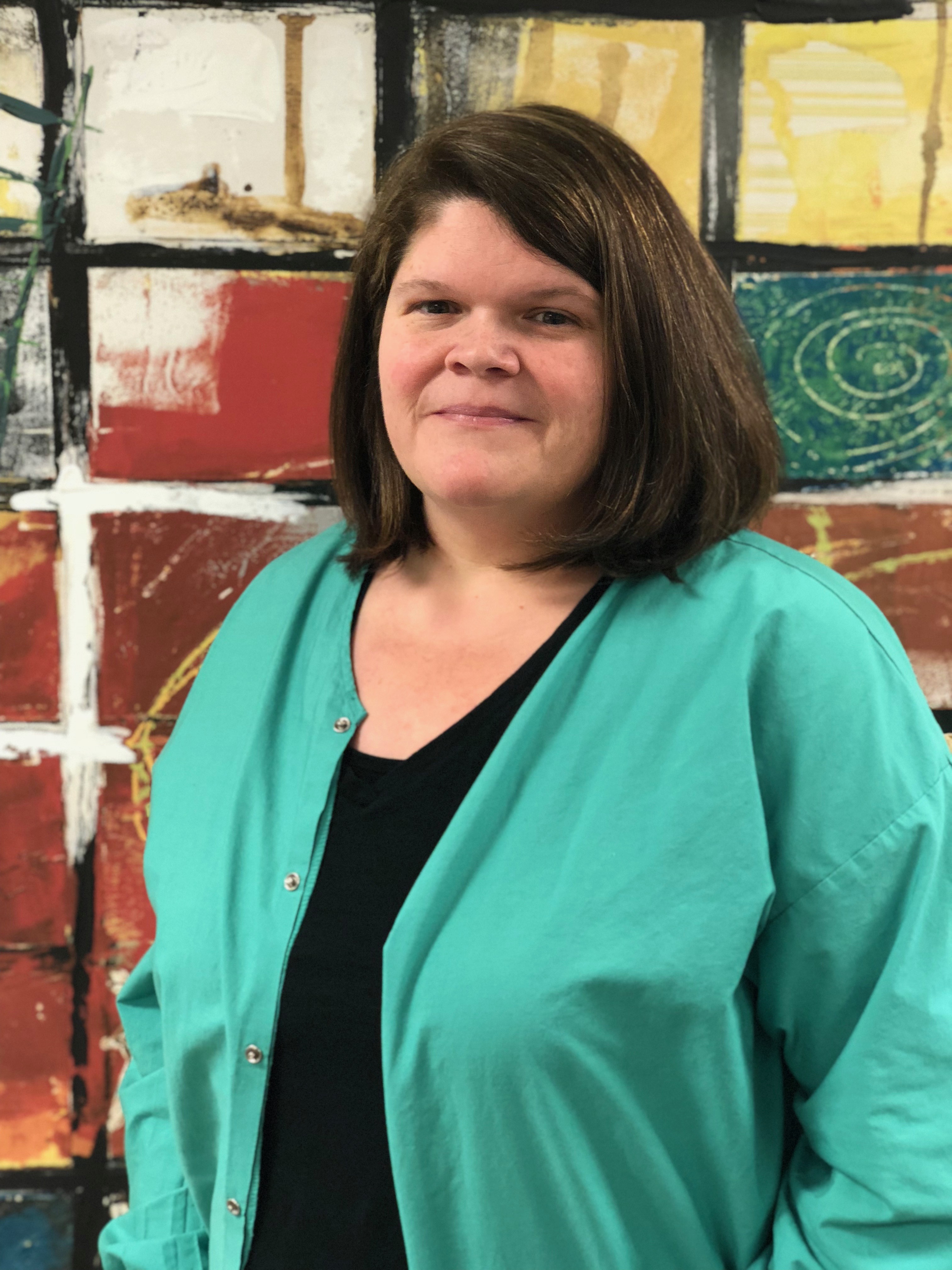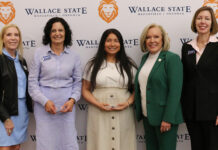Wendy Shaw is Cullman’s first-ever certified nurse midwife. / Cullman Primary Care
CULLMAN – Cullman native Wendy Shaw is happy to be home. She’s even happier to be breaking new ground as the city’s first-ever certified nurse midwife (CNM). Shaw is now practicing at Cullman Primary Care Obstetrics & Gynecology and can deliver babies at Cullman Regional.
What is a CNM? According to the American College of Nurse-Midwives, CNMs, are registered nurses who have graduated from a nurse-midwifery education program accredited by the Accreditation Commission for Midwifery Education (ACME) (formerly the American College of Nurse-Midwives (ACNM) Division of Accreditation (DOA)) and have passed a national certification examination to receive the professional designation of certified nurse-midwife.
Shaw joined Cullman Primary Care Obstetrics & Gynecology in late November after most recently practicing for five years in Gulf Port, Mississippi.
“When I was pregnant with my kiddo, my 19-year-old, I decided I wanted to be a midwife, and so I went to nursing school and did labor and delivery for about, I think I did it close to five years, and then I went back and started working on my master’s degree to be a midwife," said Shaw. “I took the long way around because I had a kiddo, but it took me probably about three to four years to get that degree wrapped up. Took me about another year to find a job, somebody that was willing to take on a new midwife, and I ended up in Gulf Port and was there for five years.”
Shaw talked about what exactly a midwife is.
“It’s taboo, yeah, sometimes. People don’t know; everybody goes, ‘Oh, do you deliver at home?’ Um, no, I don’t deliver at home, that’s not how it works here. I deliver in the hospital. I’m kind of like a nurse practitioner for an OB/GYN, and then I do the delivery portion also. So I do some of, well, woman care, you know, contraceptive stuff for girls and women that need it that are married and need stuff like that. STDs, I treat those, take care of the adolescents who need help with that and with birth control. I do a lot of OB; that’s what I’ve been doing for the past two years. Mostly OB because that’s what the practice – it was three OB/GYNs and they hired me to do some OB, you know, to deliver."
Shaw continued, “I want to work with women to develop a plan of care that they are okay with and that we can come to an agreement about. Some intervention, maybe not even any intervention, and then the ones that want every intervention I can do that too, so it’s a big mix of what I can do. Take care of high-risk patients, diabetic patients, hypertensive, that kind of stuff, as well as those people who have no risk factors and want nothing and just want a home birth but in a hospital setting. I can do that too. I have all those skill sets and am very comfortable with all that. There are some things that are too high-risk for me, and that’s why we have OB/GYNs. I don’t do surgery, but my patients do get epidurals; they have IV pain medications. They have what they need and want. The ones that don’t, we do everything we can to try and get them through the labor process and have a healthy baby and healthy mama.”
So, what brought Shaw home?
“I grew up here in the Welti area and went to high school at Holly Pond. I went to school here and worked as an RN. My actual first job in labor and delivery was at Cullman Regional Medical Center,” Shaw smiled. “I did about six months in Mother & Baby over in Atlanta when I first got out of nursing school because nobody around here would hire you fresh out of school as a labor and delivery nurse at that time. So I went over there and this position came open. My aunt works here at the hospital, and she called me and let me know, so I applied for it and they hired me, so I came back.
“I was here for about a year, then I decided I wanted to get some high-risk experience and a lot of volume. Cullman at that time was probably doing 40, 50 deliveries a month, but I was working night shift. I mean it was busy, but it wasn’t like UAB, so I went to UAB and worked there for several years. After the first year I started being in charge on nights, and you know we’re talking 400-500 deliveries a month, so that’s a much higher volume. So I got to see a lot of stuff, and you also get to work with residents, so it’s a teaching environment. They were always ready to teach and you were always hearing the new stuff that was coming out, which was good. After I had some experience from UAB, that’s when I thought I was ready to go back to (school).”
Shaw said she’s happy to be back, but misses the patients she bonded with in Mississippi.
“So far, so good. I love being home, I’m ready to get started. I’ve been seeing a few of the partners’ patients, but it’s not like seeing your own patients,” she said. “It was hard to leave, you know, because some of those people I would’ve been delivering their third baby sometime this month. There’s been a couple that delivered right after I left that would’ve been their third baby I’d have delivered. It’s tough when you have that patient bond and you have to leave those women, and it’s hard on them too, I’m sure.”
Do you find that midwives have a much closer relationship with patients?
“I think that varies on who the OB is and how they treat their patients. I’ve seen some OB/GYNs that have really good relationships with their patients and their patients don’t want to see anybody else, and that’s also the case with me. My patients were like, ‘Well what am I gonna do?’ I’ve promised that they’ll get good care and they say, ‘But it’s not gonna be you, though.’ It’s just different between people, but when you’ve seen somebody for 10 months almost, you do get a connection with them. Especially if you’ve seen them with multiple pregnancies, so I think that happens with OB/GYNs too,” she said. “Maybe more, because I don’t have to do surgery. I mean, I am up in the middle of the night, but if I am up then it’s to do a delivery or whatever, not surgery. I do assist with C-sections if my patients have to have one or if I have a mom that just wants a repeat C-section, but other than that I’m not the primary one. I’m just there to help at that point. I do have a little bit more time, so I can spend longer with them, and some patients want that, and some patients don’t; they want you to come in and do what you gotta do so they can move on with their life. So everybody’s kind of different.”
If there’s a woman out there that’s just recently found out she’s pregnant or is planning to have a child and is wanting to go with a midwife, what would you tell them to expect along the way?
“I would say expect kind of what you, if you’ve had a child before with an OB/GYN, it’s the same type of care. I practice evidence-based just like they do, I try to be up-to-date on stuff, but I’m also discussing it with them and we’re making decisions together, and I try to keep an open mind if they want something that’s a little bit out of the box. As long as it’s safe and there’s no harm, then we just move on and let them do it.”
Like water births?
“Yeah, I don’t know what the hospital’s policy will be on that, but probably won’t be doing stuff like that, especially in the beginning. Things may change down the line, but I can’t – I don’t know that they would even have the facilities for that here, because there’s a lot of things that have to go into place for that to be safe, especially when you’re having multiple patients use the same tub and that kind of stuff. So I don’t think that that would be an option, but you can get in the shower while you’re in labor, or walking around while you’re in labor versus being in bed. Something like that, that’s kind of what my patients do. And a lot of times I tell them to stay at home as long as they can, until they can’t stand it anymore. Usually that’s the best thing to do because you come in and you’re almost ready to have your baby.”
What’s the biggest satisfaction you get from your profession?
“I think just seeing that mom and the partner, dad, or whoever – maybe it’s their grandma there with them – but just seeing them with that new baby and how happy they are,” Shaw smiled. “You see them, especially the young girls, you see them grow up to be good moms, and you see them the next year and they’re doing well. I think that’s the biggest. Seeing them, and seeing that healthy baby at the end. It doesn’t always turn out like that, but the majority of the time it can and will.”
Cullman Primary Care Director of Human Resources & Marketing Shana Hice shared, “We’re just excited to have a female presence in our OB/GYN department because we know we have great physicians and we have a great service to offer, but you have those patients who are more comfortable with a female, and to have Wendy up there is just a great asset to our practice. It’s just gonna complement the group so well, you know, we’re just excited to offer that service to the community and be able to work with Cullman Regional to expand their OB/GYN & Delivery department, too.”
And it helps to have a hometown personality, too.
“Exactly! We love having people coming home!”
Copyright 2017 Humble Roots, LLC. All Rights Reserved.





























